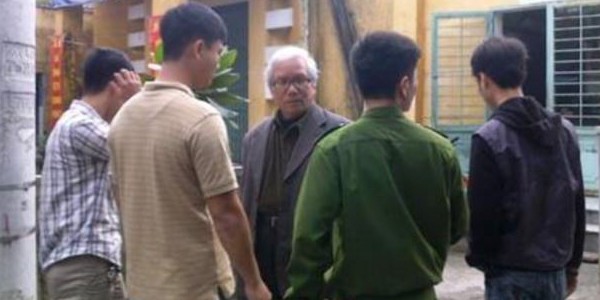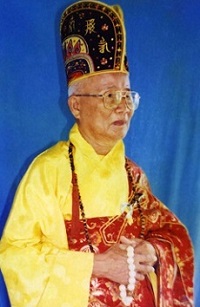PARIS, 12 March 2016 (VCHR) – Security Police in the central city of Huế are preparing to forcibly expel Buddhist Youth leader Lê Công Cầu from his home because of his activities in support of the non-recognized Unified Buddhist Church of Vietnam (UBCV).
Lê Công Cầu informed the Vietnam Committee on Human Rights (VCHR) today that Security Police are forcing him to move out of the flat in 154 Phan Bội Châu Street, Huế, where he has lived for the past 13 years. Over the past month, he has been subjected to threats, harassments and interrogations, Police have intimidated his landlord, and groups of hired thugs and plain-clothed security agents are threatening to throw his possessions into the street if he does not move out immediately.
In a recent “working session” (interrogation) at the Trường An District Police station on 9 March, Security Police told Lê Công Cầu they were expelling him (a) because of his support of the UBCV, which is considered an “illegal” organization, and (b) because, for the past two years, the Police had lost their status of “flag holder” in the government’s “emulation campaign” because of his presence in their district. Losing this status not only means a loss of prestige, but also a cut in perks and privileges for the local Security Police.
“The Communist Party says that Security Police are “the servants of the people”. Yet they regularly abuse their powers to intimidate and repress peaceful citizens”, said VCHR President Võ Văn Ái. “Vietnam should cease harassment of Lê Công Cầu and all others who are simply urging the authorities to respect constitutionally-guaranteed freedoms and rights”.
Lê Công Cầu reports that harassments began at the beginning of February, during the Lunar New Year. Police summoned his landlord and said he must terminate Lê Công Cầu’s lease. The landlord was reluctant to do this, since Cầu regularly paid his rent and never caused any trouble. Police then increased pressure, subjecting the landlord to repeated “working sessions”, and finally threatening to cut off the electricity and water in his building if he did not expel Lê Công Cầu.
Understanding his landlord’s predicament, Lê Công Cầu looked for alternative accommodation. He found new lodgings, signed a contract and made a down payment. However, when the owner went to the Police to obtain the mandatory Temporary Residence Permit in the name of the new tenant, Lê Công Cầu, the Police refused. The same scenario occurred in five other places where flats were up to let. Wherever he went, his application was accepted, and then turned down. It became clear that Police had blacklisted Lê Công Cầu for residence in all the wards and districts in Huế.
In protest, Lê Công Cầu sent a letter on 7 March to the Huế provincial authorities and Security Police, with copy to VCHR President Võ Văn Ái, denouncing the Security Police’s unlawful harassment as violations of Article 22 of the 2013 revised Constitution which guarantees that “the citizen has the right to have legal domicile: Everyone is entitled to the inviolability of his domicile” and Article 23 which enshrines the right to freedom of movement and residence. He demands the right to stay in his present lodgings. In his letter, Lê Công Cầu also said he had been subjected to “hundreds of interrogations” over the past years because of his support for the independent UBCV. He stressed that this repression would never induce him to renounce his engagement for the UBCV and its leader, Most Venerable Thich Quang Do.
The arbitrary treatment of Lê Công Cầu is typical of the systematic harassments, intimidation, surveillance, physical assaults and detention faced by all followers of “non-recognized” religious movements, human rights defenders, bloggers and activists in Vietnam. In recent years, to avoid international condemnation, Vietnam has avoided high-profile political trials, but stepped up beatings and harassments against dissidents.
“Vietnam holds a seat at the UN Human Rights Council and seeks to strengthen ties with the international community, yet at home it perpetuates a climate of fear aimed at stifling independent civil society voices”, said Võ Văn Ái.
The VCHR has forwarded the case of Lê Công Cầu to the office of the UN High Commissioner on Human Rights (OHCHR) in Geneva.






0 Comments
You can be the first one to leave a comment.